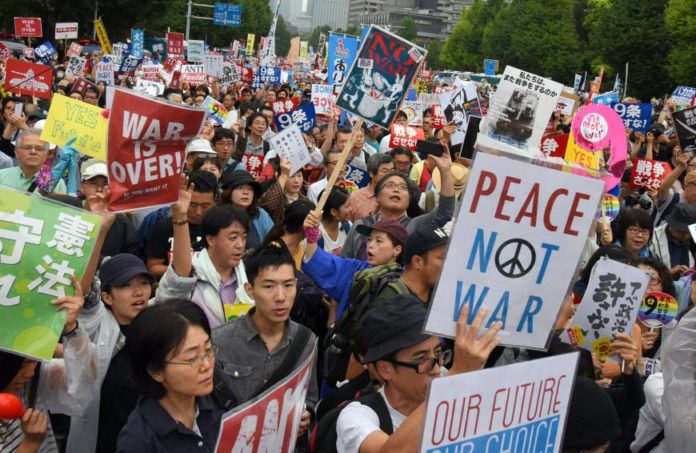
A massive rally, organized by a union of three different anti-war citizens’ groups, filled the streets outside Tokyo’s parliament on August 30 to oppose Prime Minister Shinzo Abe’s attempts to change the country’s peace constitution that mandates ‘defense only’ military posture.
Nearly 120,000 anti-war protesters, from young people, mothers and children to the elderly who had witnessed WWII, braved the rain to participate in the rally that saw demonstrators singing songs, beating drums, shouting slogans and waving banners and placards as they demanded the bills’ abolition and Abe’s resignation. “War is over!” “No War!” “No to war, yes to peace!”“Peace not war” and “Stop the security bills,” as well as “Abe, quit!” and “Stop Abe!” they chanted in one of the biggest protests in recent memory.
Aerial photo of today’s anti-security law protest, by @asahi_photo. #Japan political debate getting more heated. pic.twitter.com/15OheFEjyF
— Martin Fackler (@facklernyt) August 30, 2015
Abe’s government argues that the changes are needed for Japan to respond to a harsher security environment, including a more assertive China and growing terrorist threats, and to fulfill expectations that it will contribute more to global peacekeeping. A bill violating the constitutional clause limiting the military to self-defense has passed the lower house of parliament and is being debated in the upper house.
If passed by the upper house, Abe administration’s contentious security legislation would allow the country’s military to engage in overseas fighting for the first time since WWII and ratchet up spending on new weapons systems. Critics, who believe the change is being pushed by the US to gather Japanese support in case of a conflict in the Far East, fear that the new war law would drag Japan into unwanted conflicts overseas.
According to Associated Press, the 2011 Fukushima nuclear plant disaster prompted a spurt of anti-nuclear protests. Among others, a group of college students known as SEALD (Students Emergency Action for Liberal Democracy) is galvanizing activists who respect the constitution, a robust social safety net and peaceful security policies.
今日は本当にお疲れ様でした! 歴史的な日になりました 決壊して、最前線進んでくとき警察の人がすごい押してきて怖かったけど、みんなに助けられながら正門前で抗議したことは一生忘れないです!!! #SEALDs #本当に止める pic.twitter.com/dmGgjJt0Io — タクヤ (@harukapon1) August 30, 2015
Today’s student protesters are neither political ideologues nor radicals, said Stephen Nagy, professor of politics and international studies at International Christian University in Tokyo. “The difference stems from Japan’s apolitical post-World War II society, the lack of political diversity, and affluence, which decreases incentive to be politically active and knowledgeable,” he added.
75-year-old Michio Yamada said he was determined to thwart the bills’ passage and prevent Japan from ever engaging in a war again for the sake of his five teenage grandchildren. “With the advance of technologies (over the past seven decades), war is likely to be more deadly than it used to be. In this age of nuclear weapons, you will never know how massive a death toll is going to be. The danger is far bigger than before. We should never let it happen again,” he added.
Several opposition party leaders also attended the protest, including Katsuya Okada, head of Japan’s largest opposition party – the Democratic Party of Japan. “We need to make the Abe government realize the public is having a sense of crisis and angry. Let’s work together to have the bills scrapped,” Katsuya Okada said addressing the rally.
This Article (Over 100K Take To Streets To Reject Japan PM’s ‘Robust’ War Law) is free and open source. You have permission to republish this article under a Creative Commons license with attribution to the author and AnonHQ.com.




